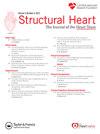严重主动脉瓣狭窄的医疗保险受益人等待经导管主动脉瓣置换术的成本
IF 1.4
Q3 CARDIAC & CARDIOVASCULAR SYSTEMS
引用次数: 0
摘要
背景主动脉瓣狭窄(AS)是一种常见的瓣膜疾病,需要及时进行干预,尤其是在出现症状时。主动脉瓣置换术(AVR)是推荐的治疗方法,但主动脉瓣置换术的延误很常见,而且与不良预后和医疗成本增加有关。本研究旨在评估有临床症状的主动脉瓣置换术(AVR)的医疗保险优势受益人延迟经导管主动脉瓣置换术(TAVR)所带来的医疗成本负担。方法和结果这项回顾性数据库研究利用了 Optum 去标识化美国索赔数据库,其中包括医疗保险优势参保者。根据医疗账单代码确定 65 岁或以上的患者患有强直性脊柱炎,并要求患者在强直性脊柱炎确诊前、确诊当日或确诊后 30 天内有晕厥、呼吸困难、乏力、胸痛/心绞痛或心力衰竭的记录。对两年内的医疗总费用进行了分析,将其与接受 TAVR 的延迟时间进行了回归,并根据协变量进行了调整。在符合研究纳入标准的4105名患者中,TAVR的延迟与医疗费用的显著增加有关,与及时接受TAVR的患者相比,等待12个月后接受TAVR的患者额外增加了10080美元的费用。结论临床意义重大的强直性脊柱炎患者延迟TAVR与较高的医疗费用相关,强调了及时干预的必要性。解决TAVR就诊延迟问题并优化TAVR术前检查可改善患者预后,降低医疗费用。本文章由计算机程序翻译,如有差异,请以英文原文为准。
The Cost of Waiting for a Transcatheter Aortic Valve Replacement in Medicare Beneficiaries With Severe Aortic Stenosis
Background
Aortic stenosis (AS) is a prevalent valvular disorder necessitating timely intervention, particularly when symptomatic. Aortic valve replacement (AVR) is the recommended treatment, but delays in access to AVR are common and linked to adverse outcomes and increased health care costs. This study aims to assess the health care cost burden associated with delaying transcatheter AVR (TAVR) in Medicare Advantage beneficiaries with clinically significant AS.
Methods and Results
This retrospective database study utilized the Optum de-identified U.S. claims database, encompassing Medicare Advantage enrollees. Patients aged 65 years or older were identified as having AS based on medical billing codes and were required to have a record of syncope, dyspnea, fatigue, chest pain/angina, or heart failure prior to, on or within 30 days of their incident AS diagnosis. Total health care costs were analyzed over a 2-year period, regressed against the delay in receiving TAVR, and adjusted for covariates. In the 4105 patients meeting study inclusion criteria, delays in TAVR were associated with a significant increase in health care costs, translating to those waiting 12 months for TAVR incurring an additional cost of $10,080 compared to those receiving TAVR promptly. Non-TAVR related costs largely drove this increase.
Conclusions
Delaying TAVR in clinically significant AS patients is associated with higher health care costs, emphasizing the need for timely interventions. Addressing delays in TAVR access and optimizing pre-TAVR workup can potentially improve patient outcomes and reduce health care expenditure.
求助全文
通过发布文献求助,成功后即可免费获取论文全文。
去求助
来源期刊

Structural Heart
Medicine-Cardiology and Cardiovascular Medicine
CiteScore
1.60
自引率
0.00%
发文量
81
 求助内容:
求助内容: 应助结果提醒方式:
应助结果提醒方式:


